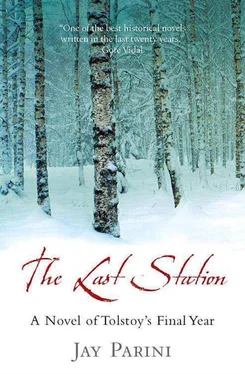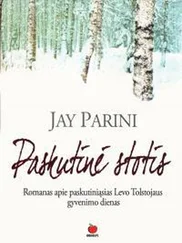‘You are a fine young man,’ I said, rocking in my chair. ‘Very clear eyes. Nice features.’ A fire had been laid for me, and tea was brought in crystal glasses.
‘Thank you, Sofya Andreyevna,’ he said. ‘It pleases me when my looks give someone pleasure, though I doubt that one should take credit for one’s features. I had very little to do with their invention.’
‘You might have ruined them by now. I have seen many young men ruin their looks by drinking and eating and running with loose women. You have kept yourself pure – a real Tolstoyan, I can tell!’ I fought to keep a lid on myself. If he sensed a note of ridicule in my voice, it might destroy everything between us. Like most young men, Bulgakov is oversensitive. He has not yet been around many adults, especially of the female sex.
‘I admire Leo Nikolayevich immensely.’
‘Good. He will like that. No amount of admiration surfeits him.’
Bulgakov was uncomfortable, so I changed my tack. ‘He is deeply grateful for the help you’ve been giving him. You’ve come up with a great many useful passages. He told me so himself. I think it surprises him that such a young man could be learned. When he was your age, he was whoring in the Caucasus.’
The dear boy cleverly ignored my derisory remarks about Lyovochka – a good sign. Tact is among the more socially useful forms of insincerity. It is noticeably lacking among my husband’s associates. Lyovochka, of course, has never had to worry about not offending people. If you are Leo Tolstoy, you merely reveal the Truth.
‘ For Every Day is a noble project,’ he said. ‘It will help people to live more contemplative lives.’
‘Contemplative lives!’ I said. ‘You say lovely things, Valentin Fedorovich. A gift for the apt phrase!’
He was staring past me, out the window, where the snow was falling.
‘The winter has been good to us,’ I said. ‘Even with the snow. Not more than we can bear. I used to dread winters in the country. But Leo Nikolayevich adores it here. I can hardly ever get him to go to Moscow, except for the briefest visits. The crowds upset him. They mob him now – like an emperor. It’s hardly safe for him to travel.’
‘I heard about what happened at the Kursk Station.’
‘There were thousands of them, screaming and cheering, pushing around us! Thousands! The tsar himself does not attract such attention.’
He liked to hear me praise Lyovochka, especially his books. Unlike Gusev, who was a crass illiterate, Bulgakov has read everything by my husband. War and Peace he called ‘a monument’ and asked about its origins. So I told him about the five years it took to complete – back in the mid-sixties. Can it be so long ago? We saw almost no one during that time. Lyovochka wrote furiously, with no regard for the things of this world, no fretting over disciples, no Chertkov or Sergeyenko hovering beside him and tearing every sheet off the desk before the ink was even dry! I, his young wife, worked beside him through every stage.
‘I hunched over his manuscripts with a magnifying glass, trying to make out the infinite corrections, till my head almost burst with pain,’ I told him. ‘But it was bearable pain. I would awaken each day dreaming of Pierre and Natasha, of Prince Andrey and his father, even old Kutuzov!’
Bulgakov listened keenly. He is in love with Lyovochka. I could see that in his eyes.
‘My life is difficult now,’ I said. ‘You know that Leo Nikolayevich and I have had disagreements.’
‘I’m sorry.’
‘What is obvious cannot be ignored.’
‘I’m aware that there is a good deal of trouble between you.’
‘He thinks of me as his enemy, not his friend. But Leo Nikolayevich, my Lyovochka, is old and sick. We nearly lost him a few months ago, you know. He went unconscious for a day. His pulse nearly stopped.’
Bulgakov nodded. Furrows of sympathy deepened in his brow. His gaze was innocent as a pond.
‘You must help me, Valentin Fedorovich. I want only what is best for Leo Nikolayevich and his family. They want to separate us. You have seen as much, I’m sure. I could tolerate the situation if it only concerned me – I would dislike it, but I could stand it. What is unreasonable is for me to sit back while they steal his children’s inheritance.’
‘They would never do such a thing.’
I tried not to laugh. ‘They will do whatever is necessary to accomplish their ends.’
My young visitor grew ill at ease. I decided not to ask for his help. Not yet. I had first to be sure of his friendship, though I could see that a bond existed between us.
‘I will give you a present,’ I said, pulling from my dresser a small notebook I had bought in Moscow several months before. It had a neatly embossed cover, and the paper was handmade in Amalfi.
‘You’re much too generous, Sofya Andreyevna, I’m afraid I–’
‘Please! It’s yours, Valentin Fedorovich. For keeping a diary. You must always keep a diary.’
‘It is a popular activity in the province of Tula.’
‘You’re teasing me. Never mind. I will expect you to search your conscience daily, then to record the truth.’
‘The truth may not be so easy to find.’
‘You’ve been listening to your friends at Telyatinki. There’s enough truth about for all of us. Write what you see. That’s always the place to begin. Trust your eyes!’
He kissed me on both cheeks and bowed. His politeness was refreshing, and it made me long for Moscow. The crudeness of life around here is intolerable. I was not brought up to live like an animal.
I sat quietly by myself for a long time after Bulgakov left, thinking about him. And all morning I have thought about him still more, while the snow continues to fall, a dry, dusty snow that swirls on the window ledge, freshens the white fields, the whiter distance. I hear sleigh bells coming and going. Something is going on, but I am afraid to inquire. I feel certain that if the wheel does not turn my way soon, I shall be finished. I shall die, after which my children and grandchildren will be left with nothing. I pray that Valentin Fedorovich will help me.
DIARY ENTRY
5 JANUARY 1910
I am sad. The people who live around me seem terribly alien to me. I have been trying to think how to react to the irreligious people of this world. Perhaps the best approach is to treat them like animals: love them, pity them, but make no attempt to enter into spiritual relations. Such attempts at connection would only produce unkindly feelings. These people do not comprehend my reality, and by their lack of comprehension and self-assurance, employing rational argument to darken the truth, refuting truth and goodness, they provoke me to unkindness. I express myself very badly, but I feel one must cultivate in oneself a special attitude toward such people so as not to impair one’s ability to love them.
‘I had a dream, Dushan,’ Leo Nikolayevich said this morning. ‘Shall I tell you my dream?’
He did not seem well. His beard was straggly and yellow. I took his pulse and temperature. They were normal, but his eyes appeared more glittery than usual. I asked him how his vision was, and he said, ‘You’re always worried about my health, Dushan.’
‘I’m your doctor, Leo Nikolayevich!’
‘I don’t care what you are. I’m an old man. Old men are unlike young men in one important respect: they are not healthy. I am going to die soon. So let’s worry about something more important.’
I am quite happy, often, to dwell on trivial subjects. But I put away my medical things, not wishing to irritate him. Irritation increases his pulse rate.
Читать дальше












